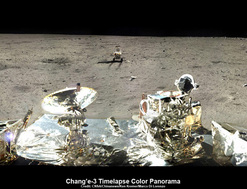
Nearly 40 years has passed since the last soft
landing on the Moon. Last month, China accomplished this task with its Chang’e 3 lander and Yutu rover.
A soft landing is accomplished when spacecraft thrusters are used to slowly lower the craft within several feet of the surface
of the Moon before touching down. These landings are more difficult to accomplish than hard landings – a lunar touchdown at full orbital speed. Since the mid-1970’s, the Moon landings have been hard landings. With this latest landing, China has revealed to the world its involvement and dedication to space exploration.
The lander Chang’e was named after the Chinese goddess of the Moon. The Yutu rover is named after the Chang’e’s pet jade rabbit. Yutu has a three-month mission to take pictures, gather rocks, conduct analysis and measure the structure and depth of the Moon’s surface to nearly 100 feet.
Yutu is powered by our sun which limits travelling to during the lunar day only – during the lunar nights, Yutu waits patiently for the next lunar sunrise.
The Chang’e 3 mission has sparked a debate about possible exploitation of the Moon’s resources – who has rights, if anyone to extract resources from the Moon? Chinese scientists’ believe that the Moon is a potential source of minerals.
“Currently, no one can claim ownership of the Moon,” says Planetary Science Professor Ian Crawford, of Birkbeck College University of London. “The legal status of the Moon is governed by the 1967 Outer Space Treaty, Article 2 of which specifically prohibits nation states from appropriating the Moon," said Crawford.
“Within the next few decades the economic exploitation of the Moon will be technically feasible," said Crawford. "Even if there are not minerals to be extracted, the space tourism industry is gathering a lot of momentum so one might imagine interest in sending people to the Moon as just fare-paying passengers. None of this is currently covered by the 1967 Treaty.”
Many feel that countries like China will surpass the United States in technology and space exploration. Some in the space industry fear that and cost American companies dollars. Robert Bigelow is a commercial space entrepreneur who owns Bigelow Aerospace Company. This business creates inflatable space habitats. Bigelow believes that China will continue to rise and eclipse the United States in leadership in space
exploration. “China is likely to claim ownership of the moon if other nations do not step up to challenge them,” claims Bigelow.
NASA’s reaction to China’s successful rover landing came from a late December post on Space Policy Online, stating, “…We welcome all countries' peaceful exploration of space, and look forward to China’s public release of the scientific results from the Chang'e 3 mission to the moon.”
landing on the Moon. Last month, China accomplished this task with its Chang’e 3 lander and Yutu rover.
A soft landing is accomplished when spacecraft thrusters are used to slowly lower the craft within several feet of the surface
of the Moon before touching down. These landings are more difficult to accomplish than hard landings – a lunar touchdown at full orbital speed. Since the mid-1970’s, the Moon landings have been hard landings. With this latest landing, China has revealed to the world its involvement and dedication to space exploration.
The lander Chang’e was named after the Chinese goddess of the Moon. The Yutu rover is named after the Chang’e’s pet jade rabbit. Yutu has a three-month mission to take pictures, gather rocks, conduct analysis and measure the structure and depth of the Moon’s surface to nearly 100 feet.
Yutu is powered by our sun which limits travelling to during the lunar day only – during the lunar nights, Yutu waits patiently for the next lunar sunrise.
The Chang’e 3 mission has sparked a debate about possible exploitation of the Moon’s resources – who has rights, if anyone to extract resources from the Moon? Chinese scientists’ believe that the Moon is a potential source of minerals.
“Currently, no one can claim ownership of the Moon,” says Planetary Science Professor Ian Crawford, of Birkbeck College University of London. “The legal status of the Moon is governed by the 1967 Outer Space Treaty, Article 2 of which specifically prohibits nation states from appropriating the Moon," said Crawford.
“Within the next few decades the economic exploitation of the Moon will be technically feasible," said Crawford. "Even if there are not minerals to be extracted, the space tourism industry is gathering a lot of momentum so one might imagine interest in sending people to the Moon as just fare-paying passengers. None of this is currently covered by the 1967 Treaty.”
Many feel that countries like China will surpass the United States in technology and space exploration. Some in the space industry fear that and cost American companies dollars. Robert Bigelow is a commercial space entrepreneur who owns Bigelow Aerospace Company. This business creates inflatable space habitats. Bigelow believes that China will continue to rise and eclipse the United States in leadership in space
exploration. “China is likely to claim ownership of the moon if other nations do not step up to challenge them,” claims Bigelow.
NASA’s reaction to China’s successful rover landing came from a late December post on Space Policy Online, stating, “…We welcome all countries' peaceful exploration of space, and look forward to China’s public release of the scientific results from the Chang'e 3 mission to the moon.”
 RSS Feed
RSS Feed
